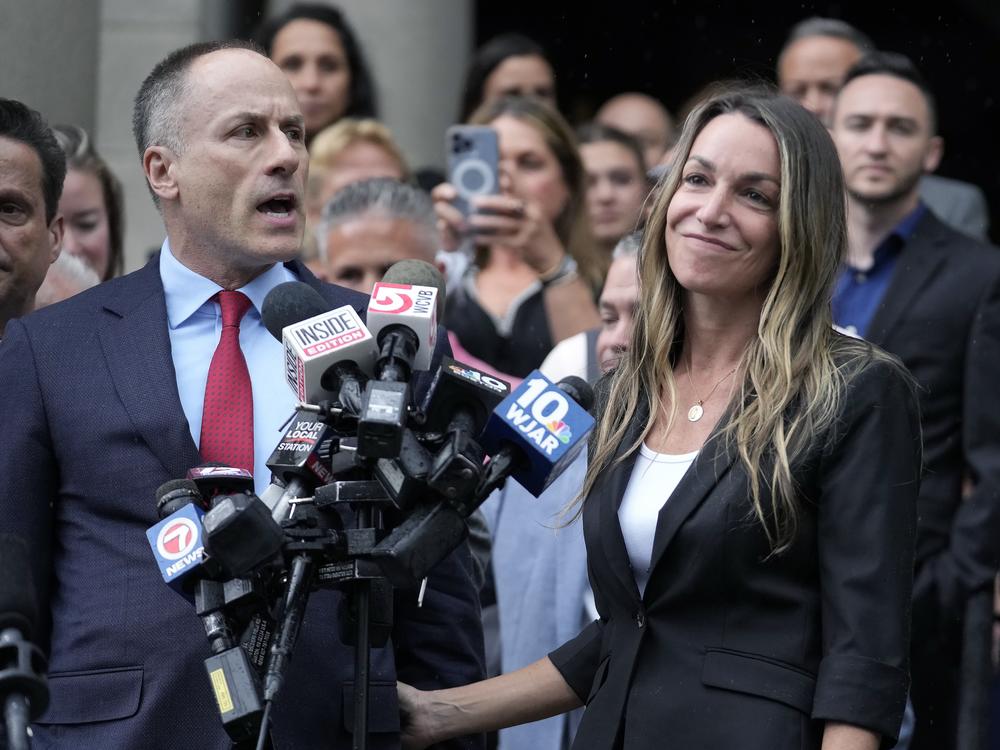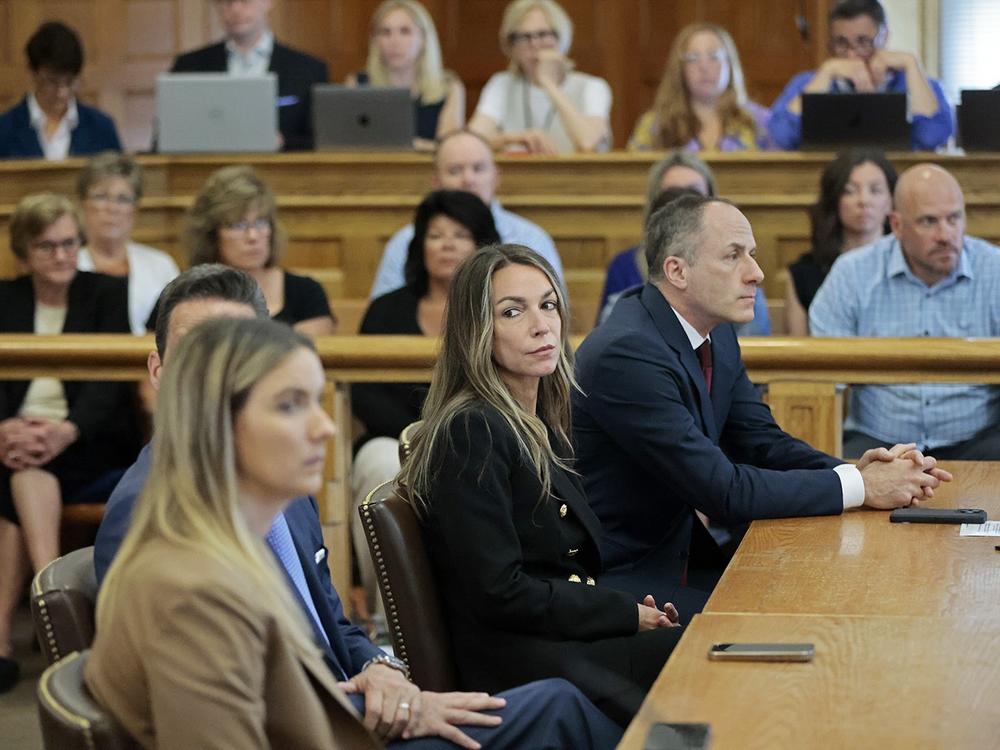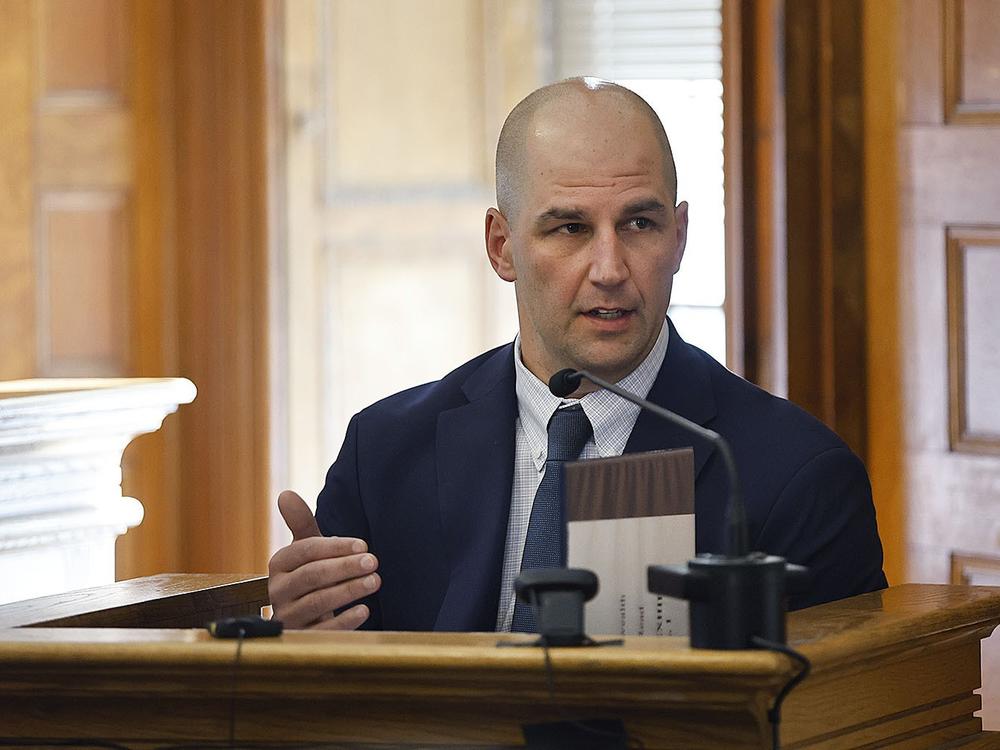Section Branding
Header Content
Karen Read's high-drama murder trial ended with a hung jury. Here's what to know
Primary Content
The murder trial of Karen Read, which divided a Massachusetts community and captivated much of the country for more than two months, ended in a mistrial on Monday after the jury emerged from several days of deliberation completely deadlocked.
Read is accused of killing her boyfriend, Boston police officer John O'Keefe, by backing her Lexus SUV into him and leaving him for dead in a snowstorm as she dropped him off at a fellow officer's house after a night of drinking in January 2022.
But her supporters allege that Read is the victim of an elaborate cover-up by police. Her lawyers say O'Keefe's law enforcement colleagues killed him, dragged him outside and framed Read for his death, including by planting evidence at the scene.
The trial, which began in April, featured more than 70 witnesses and over 600 pieces of evidence, drew throngs of protesters from both sides outside the courthouse, spawned a separate case of witness intimidation against a blogger and ended with the state trooper who had led the investigation being relieved of his duties late Monday.
The jury of six men and six women first declared themselves at an impasse on Friday, after four days of deliberation, and on Monday morning delivered Judge Beverly Cannone a letter saying that remained the case.
"The divergence in our views are not rooted in a lack of understanding or effort but deeply held convictions that each of us carry, ultimately leading to a point where consensus is unattainable," they wrote.
Cannone told them to keep deliberating, under a "last resort" measure called a Tuey-Rodriguez instruction. When that didn't work, she declared a mistrial, leaving it to prosecutors to decide whether to try the case again.
The Norfolk County District Attorney's office said in a statement that it does intend to retry the case. Defense attorney Alan Jackson told reporters outside the courthouse that Read would continue to fight what he called "spurious" charges stemming from a "compromised" investigation, according to the Associated Press.
Attorney Shira Diner, president of the Massachusetts Association of Criminal Defense Lawyers, told WBUR on Tuesday that a hung jury is not necessarily as shocking of an outcome as it may seem to some invested onlookers.
"I think because this case has gotten so much attention, people are kind of hanging onto every twist and turn of it," she added. "But this happens not infrequently in criminal cases."
Cannone has scheduled a status hearing on July 22 to determine next steps. In the meantime, here's a guide to the case so far.
What happened that night?
The central question of the case is what happened on that snowy January night in the Boston suburb of Canton.
Some of the facts are undisputed, as the AP lays out. O’Keefe, 46, was a 16-year veteran of the Boston Police Department who was raising his niece and nephew. Read, now 44, had worked as an equity analyst and adjunct professor at her alma mater, Bentley University. The pair had been dating for about two years.
Read and O’Keefe went bar-hopping with a group of friends on the night of January 28 and continued drinking into the early morning hours, according to a CBS News timeline. She dropped him off at a gathering at the home of Boston police officer Brian Albert shortly after midnight.
Between 4 and 5 a.m. the next morning, O'Keefe's teenage niece called Jennifer McCabe — Albert's sister-in-law and O'Keefe's friend — to say he had not come home and wasn't answering his phone. According to court documents, McCabe said she could hear Read's voice in the background.
McCabe, Read and a third woman went to look for O'Keefe, and at about 6 a.m. found him lying unresponsive in the snow outside Albert's house. First responders later testified that Read tried to perform CPR on O'Keefe.
O'Keefe was pronounced dead at a local hospital two hours later, with a medical examiner eventually ruling that the cause of death was blunt impact injuries to the head and hypothermia.
Police later say they found drops of blood, a broken cocktail glass and shards of a taillight at the scene.
What do prosecutors allege?
The prosecution alleges that Read hit O'Keefe while making a three-point turn and pulling out of Albert's driveway, and left him for dead in the middle of a blizzard.
They say pieces of plastic consistent with her taillight were found at the scene, and a single strand of his hair was on the bumper of her car.
Court documents point to texts between the couple that paint a picture of a strained relationship in the weeks and hours leading up to his death. Investigators allege that Read left O'Keefe a voicemail around 1 a.m. on January 29 calling him a loser and saying "John, I f****** hate you."
Prosecutors say Read told the women during their search that she saw a crack in her taillight and wondered whether she hit O'Keefe, and that she said she didn't remember anything because of how much they drank.
An emergency responder testified that Read, after O'Keefe’s body was found, repeatedly said "I hit him."
In an August 2023 Nightline interview, Read said she had phrased that as a question and that it was "not possible" she had hit him unintentionally.
Further complicating the story, both sides agree that McCabe searched online for "hos [sic] long to die in cold" but disagree on when that happened. Prosecutors say the search happened at 6:23 a.m. and 6:24 a.m., after O'Keefe's body was found, while the defense says the search was made hours earlier at 2:27 a.m.
Read was arrested on Feb. 1, 2022, on charges of manslaughter, motor vehicle homicide and leaving the scene of a deadly crash, to which she pleaded not guilty the following day.
Months later a grand jury indicted her on charges including second-degree murder, which is punishable in Massachusetts by life in prison with the possibility of parole.
What does the defense say?
Read's lawyers have alleged in court that O'Keefe was involved in a fight inside Albert's home, where one or more of his fellow officers beat him up and dumped him outside.
They suggested the perpetrator could have been Brian Higgins, a federal agent who had exchanged flirty texts with Read earlier that month.
The defense argued that a federal investigation into the case shows that the "damage on the car was inconsistent with having made contact with John O'Keefe’s body," and that his injuries didn’t align with having been struck by a vehicle either.
Read's lawyers also pointed to scratch marks on O'Keefe's arms, which they say were caused by Albert's German Shepherd during the alleged fight.
And they offered two alternate explanations for the broken taillight: Either Read broke it by hitting O'Keefe's parked car later that morning — even prosecutors acknowledge that home surveillance video shows her SUV coming close to it — or "the Commonwealth broke the taillight after it seized the vehicle and planted evidence at the crime scene."
The defense said local and state police were involved in a cover-up, with Read's lawyers pointing blame at all of the people who were in Albert's house that night. Read herself made a similar argument in her first public comments over a year later, outside a May 2023 pretrial hearing.
"We know who spearheaded this cover-up. You all know," she told reporters. "I tried to save his life. I tried to save his life at 6 in the morning, I was covered in his blood. I was the only one trying to save his life."
Prosecutors, however, deny a cover-up and say there is no evidence that O'Keefe even went inside Albert's home.
Read's lawyers pointed repeatedly to sloppy policing, including leaving the scene unsecured for hours and not searching the house. Officers borrowed plastic cups from a neighbor to scoop up blood samples in the snow, and took them back to the police station in a paper grocery bag, according to WCVB.
Lt. Paul Gallagher from Canton Police Department acknowledged during the trial that it is not standard practice to collect evidence that way, but said officers had to improvise in part because of the weather.
Why was the lead investigator relieved of his duties?
The nine-week trial was chock full of dramatic moments. One of the biggest controversies involved Trooper Michael Proctor, the lead investigator for the case with Massachusetts State Police.
In June, Proctor acknowledged from the stand that he had called Read a series of names — including "whack job" and other, more vulgar words — in texts to friends, family and fellow troopers. He wrote he wished she would "kill herself," made fun of a medical condition she had and joked in texts to supervisors that he had not found any nude photos when going through her phone, WBUR reports.
Proctor apologized for his language in court, acknowledging his texts were "unprofessional and regrettable." But he also insisted they had "zero impact on the facts and evidence and integrity of the investigation."
Proctor also acknowledged he is friends with members of the Albert family, but similarly insisted that had no impact on the investigation. Read's lawyers had long accused him of harboring conflicts of interest and not fully disclosing his personal relationships to multiple witnesses involved in the case.
In mid-March this year, while pretrial legal proceedings played out, Massachusetts State Police confirmed Proctor was the subject of an internal investigation over a potential violation of department policy, though would remain on full duty in the meantime.
On Monday night, after the mistrial was declared, Massachusetts State Police Col. John Mawn released a statement saying he had immediately relieved Proctor of duty and transferred him out of the detective unit, effective July 7 per its union agreement.
"This follows our previous decision to open an internal affairs investigation after information about serious misconduct emerged in testimony at the trial," Mawn wrote. "This investigation is ongoing."
Proctor can still be called to testify in a future retrial, Diner of the Massachusetts Association of Criminal Defense Lawyers told WBUR, but it would be as a civilian rather than state police witness.
How has the public reacted (and who is Turtleboy)?
The case has captured — and divided — public opinion in Massachusetts and beyond, fueling both in-person demonstrations and social media debates.
Recaps, theories, analysis and arguments have played out across social media in recent weeks, dominating Facebook groups and Reddit threats dedicated to the case.
In Canton, dozens of Read's supporters have gathered outside the courthouse every day of the trial — beyond the 200-foot buffer zone imposed by Cannone in April — wearing pink and waving "Free Karen Read" signs. Anti-Read protesters joined for the first time on Friday.
After the mistrial was declared, Read immediately embraced her attorneys and father before leaving the courtroom, according to WCVB. Outside in the rain, her pink-clad, umbrella-holding supporters burst into cheers and chants of "Free Karen Read."
Free Karen Read supporters react to the judge declaring a mistrial in the Karen Read murder trial.@wbz @CBSNews pic.twitter.com/nvomEwNUbW
— Penny Kmitt (@pennylikeacoin) July 1, 2024
One of Read's biggest supporters is also her most controversial.
Aidan Kearney, a blogger known as "Turtleboy,” has posted hundreds of articles defending Read's innocence, sold pro-Read merchandise and raised money for her legal defense fund. He's also filmed himself confronting witnesses in public, and has been indicted on multiple criminal charges regarding misconduct toward witnesses, which he denies.
Kearney was first arrested on charges of witness intimidation and conspiracy in October 2023, according to NBC Boston, and indicted on 16 new charges that December. That same month he was hit with new charges of assault and battery and witness intimidation, over allegations that he pushed a woman he was dating, and was sent to jail.
In January 2024, a state police affidavit alleged that Read fed confidential information to Kearney in 189 phone calls lasting over 40 hours, and other channels, the previous year. In February, Kearney was released from jail as well as indicted on two new charges of harassing a witness and intercepting wire or oral communication, to which he pleaded not guilty.
Kearney has continued to report on the trial, and drew further controversy for sitting inside the courtroom with reporters starting in May.
Cannone said his presence would have a "chilling effect" on the testimony of certain witnesses, and ordered him to leave the room while nine different people took the stand, per CBS News; The judge later removed two troopers" names from the list.
Kearney is set to return to court for his own proceedings on July 11.






